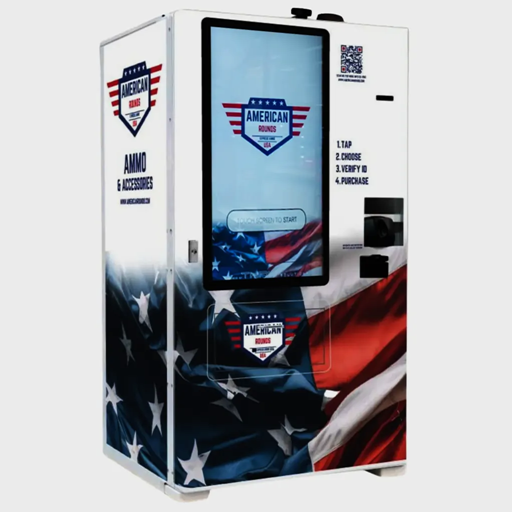With ammo vending machines, has convenience finally gone too far?
New vending machines stocked with bullets test the limits of just how easily accessible some products need to be.
BY Rob Walker
Branded is a weekly column devoted to the intersection of marketing, business, design, and culture.
The vending machine is not our most cutting-edge technology. But it’s one that we can’t seem to quit, possessed of some mysterious appeal that continues to inspire new variations on the idea of a device exchanges consumables for money with no human interaction. And the latest case in point may be the most startling example yet: automated retail machines that dispense ammunition. Yes, these are now a thing.
For decades, the eternal drive of consumer convenience has given us countless vending machine experiments, stunts, and weirdness. We’ve seen vending machines for distributing salad, caviar, bike parts, $1,000 diamond-encrusted pendants, neckties, books, artisanal pizza, violin strings, and free food for the homeless. (And the U.S. has yet to reach the levels of Japan’s vending machine culture.) But this latest example, which has already received a hail of press attention, definitely raises the question of whether everything needs to be made so convenient to buy.
The Automated Ammo Retail Machines, made and distributed by Dallas-based startup American Rounds, follow this lineage, with some new twists. The devices claim to verify a customer’s photo ID to confirm that the individual is over 21, and to use facial recognition technology to make sure it matches the person buying the ammunition. Selections are made through a touch-screen interface, with the ammunition dispensed on the spot. (This includes major brands of rifle, pistol, and shotgun ammunition, with the selection adjusted for hunting seasons.)

American Rounds’ first ammo kiosk was installed last November in a Fresh Value grocery store in Pell City, Alabama, a town of less than 15,000, 35 miles east of Birmingham. At least a half-dozen more have since been installed in retail locations in Alabama, Texas, and Oklahoma. Following the recent round of press, CEO Grant Magers tells Fast Company, his company has received “hundreds” of store requests, and consumer interest “from California to Florida.”
If this all sounds like an Onion-esque premise to you, you are not alone. “I thought it was a joke,” Tuscaloosa, Alabama, city council member Kip Tyner said during a recent council meeting, describing calls from constituents about ammunition being sold in a local grocery store. “But it’s not.” (In a video of the meeting, other council members appear bemused at the idea of picking up “bread, milk, and a round” of ammo, as one put it.)
There’s nothing inherently illegal about the ammo vending machines—which are reportedly approved by the Bureau of Alcohol, Tobacco, Firearms and Explosives (commonly known as the ATF)—so long as they comply with state and local laws and zoning rules. (Buying ammunition does not require a background check.)
Still: Why do these exist? Particularly at a time when some big retailers, notably Walmart and Dick’s Sporting Goods, have restricted some ammunition and gun sales in response to mass shootings. American Rounds’ website offers some boilerplate hyperbole: “By embracing change and challenging the status quo, we aim to revolutionize the ammunition industry, making purchasing simpler, faster, and smarter for everyone.” And Magers emphasizes a safety angle, suggesting that ammunition sold in retail settings—where ammo might sit on a shelf “like a loaf of bread,” he say—can be stolen, and online sellers can be tricked. “We’re the safest option on the market,” he insists.
That said, kiosks aren’t replacing the existing ammunition ecosystem, they’re just expanding it. And they may bring their own challenges: One cybersecurity expert told Business Insider the devices carried at least some risk of being hacked. Magers underscores the safety point, and claims that the machines do not store, share, or sell the ID information.
It’s hard to say if the machines will catch on, but according to Magers, American Rounds was founded in response to interest from grocery chains, often in rural areas, looking to give their consumers something they want—standard “free market competition,” he says. And, he adds, automated retail machines (he doesn’t use the term, “vending machine”) already exist for all sorts of adult products, including beer and cannabis. “We’re gonna see more and more automated retail,” he predicts. So an ammo-dispensing machine may seem weird now, but its real long-term goal is to make such options seem as completely normal as picking up bread and milk.
But that doesn’t mean any of these items particularly need to be made easier to buy and profit from—or that consumers more broadly will endorse them becoming a pervasive presence. That kiosk under discussion in the Tuscaloosa city council meeting was subsequently removed, but not because of legal trouble or political scrutiny. It was because sales at that location had been disappointing. Apparently, not everybody wants to buy bread, milk, and a round.
ABOUT THE AUTHOR
Fast Company
(17)